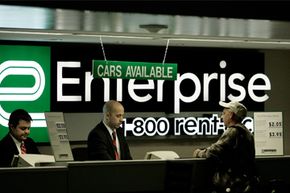We all know that traveling can be stressful and frustrating, especially when unplanned expenses start adding up. If you have family travel plans, or you're just going on a weekend excursion, one of those extra costs you didn't plan on might be rental car insurance. But do you really need to shell out the extra $20 (or more) each day to be fully protected? Before you answer that question, see how you respond to the following statements:
- My auto insurance plan covers any and all damages to rental cars.
- I have to pay my deductible if I damage a rental car under my insurance plan.
- My insurance rates won't go up if I make a claim on a rental car.
- My insurance company covers the loss of revenue for a rental car while it's being repaired.
Even if you do know your auto insurance plan covers your use of rental cars, it's likely you don't know the details of that coverage, how long the coverage lasts or how well you're actually protected. One thing you probably haven't considered is the additional costs you can be held accountable for if the rental car is damaged and has to sit in a repair shop. Although your insurance company may cover the damages, you may be personally responsible for the loss of revenue for the rental car while it's being serviced. In addition to that, rental car companies may charge you for devaluing the resale value of the vehicle as well.
Advertisement
To avoid these situations, rental car companies offer a collision damage waiver (CDW), which isn't insurance, but rather an agreement between the renter and the rental car company that states you will not be liable for any damages to the vehicle. This isn't necessarily a get-out-of-jail-free card for all damages, like accidents due to intoxication, for instance, but it does provide the most hassle-free option. CDWs can save you the pain of filing claims with your insurance company -- not to mention the rate increase you'll likely incur for causing damage to a rental car.
If you chose not to go with the CDW, some credit cards offer secondary coverage if you're involved in an accident or have other damages to a rental. If you pay with a credit card that offers secondary coverage, the credit card company may pay for expenses your insurance company won't cover. Some credit cards, like the Diners Club card, offer primary coverage that will cover most expenses and keep you from having to file a claim with your insurance company. Other cards may offer plans to increase your rental car coverage from secondary to primary, so it's a good idea to check with your credit card company for specific options.
Whether you're trying to save money or simply trying to achieve peace of mind, you should always know the terms of your auto insurance before you rent a car. Having that information ahead of time will help you make the best decision when you're standing at the rental car counter.
For more information about rental car insurance, follow the links on the next page.
Advertisement



